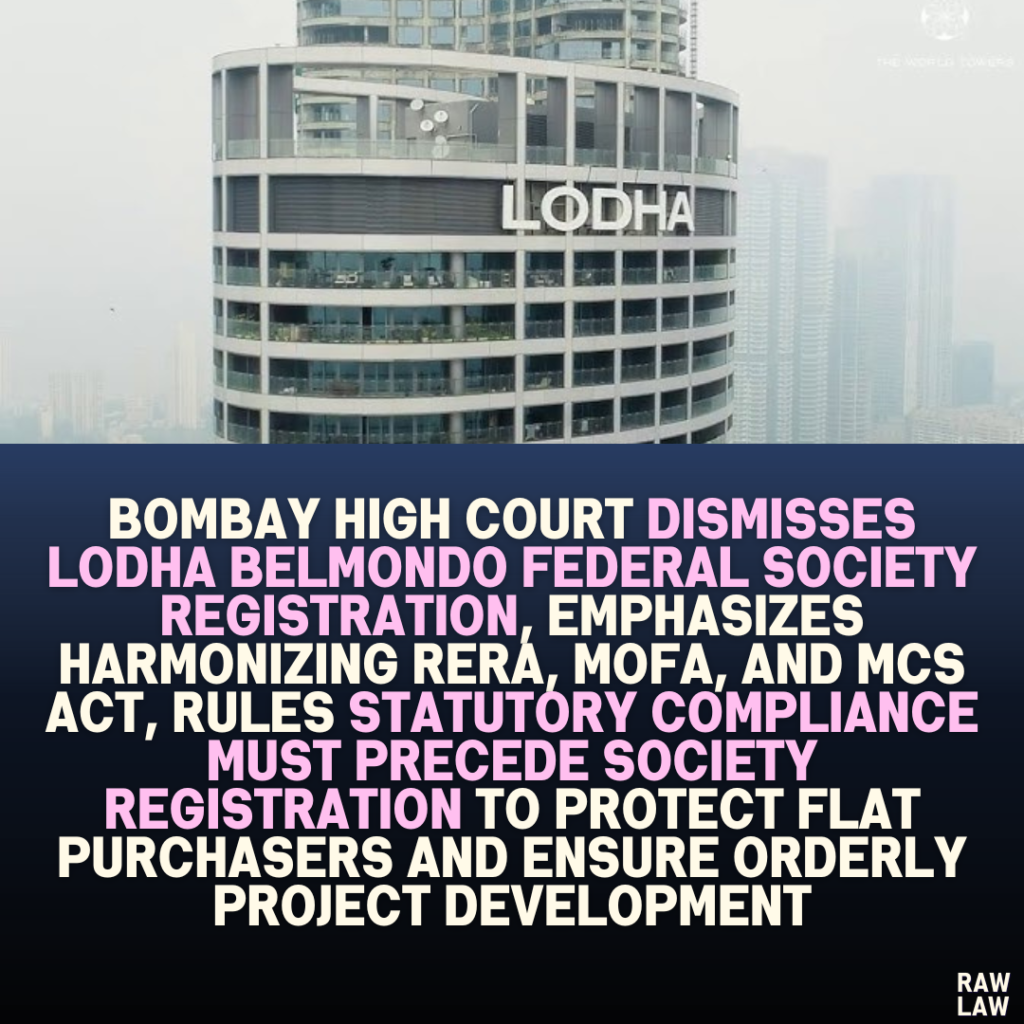Court’s Decision:
The Bombay High Court dismissed the writ petition challenging the cancellation of Lodha Belmondo Housing Federation’s registration as a Federal Society. The Court upheld the Competent Authority’s decision, ruling that the registration was premature under Rule 9(1)(ii) of the Maharashtra Real Estate (Regulation and Development) Rules, 2017 (RERA Rules). It emphasized that statutory provisions under RERA, MOFA, and the Maharashtra Co-operative Societies Act (MCS Act) must be harmonized to ensure orderly regulation of real estate transactions.
Facts:
- Project Background:
- Lodha Belmondo Housing Federation consisted of six housing societies formed as part of a large project by Macrotech Developers Ltd.
- The project, involving 33 buildings, 61 country houses, and 28 villas, included shared amenities such as a golf course and spa.
- Registration Timeline:
- The federation applied for registration on April 22, 2022, under the MCS Act and was granted registration the same day.
- The developer challenged this decision, citing non-compliance with Rule 9(1)(ii) of the RERA Rules, which mandates forming a Federal Society only after obtaining the occupancy certificate for the last building.
- Competent Authority’s Decision:
- The Competent Authority canceled the federation’s registration, deeming it premature and in violation of RERA Rules.
Issues:
- Whether the registration of a Federal Society is valid despite the project being incomplete.
- Whether compliance with Rule 9(1)(ii) of the RERA Rules is mandatory for society registration under the MCS Act.
- Whether the Competent Authority overstepped its jurisdiction by considering RERA compliance.
Petitioner’s Arguments:
- Statutory Rights:
- Argued that the MCS Act requires only five societies for registration, which was fulfilled.
- Claimed that compliance with RERA Rules should not influence society registration under the MCS Act.
- Delays by the Developer:
- Alleged that the developer’s delays in completing the project hindered flat purchasers’ statutory rights to form a Federal Society.
- No Conflict Between Statutes:
- Contended that RERA, MOFA, and the MCS Act must operate harmoniously to protect flat purchasers.
Respondent’s Arguments:
- Premature Registration:
- The developer argued that forming a Federal Society before obtaining the occupancy certificate for the last building violated Rule 9(1)(ii) of the RERA Rules.
- Harmonization of Laws:
- Emphasized that RERA, MOFA, and the MCS Act address interconnected aspects of real estate regulation and must be read together.
- Contractual Obligations:
- Highlighted that flat purchasers’ agreements mandated forming a Federal Society only after project completion.
Analysis of the Law:
- RERA Compliance:
- Rule 9(1)(ii) of the RERA Rules requires a Federal Society to be formed only after obtaining the occupancy certificate for the last building in a project.
- Harmonization:
- The Court emphasized the need to harmonize RERA, MOFA, and the MCS Act to avoid regulatory conflicts and ensure orderly real estate project management.
- Competent Authority’s Jurisdiction:
- Affirmed that the Competent Authority acted within its jurisdiction by considering RERA compliance when adjudicating the validity of society registration.
Precedent Analysis:
- Indian Ex-servicemen Movement v. Union of India:
- Established that subordinate legislation, such as RERA Rules, must align with statutory provisions unless expressly overridden.
- Noopur Developers v. Himanshu:
- Reinforced that developers cannot indefinitely delay society registration but must adhere to procedural timelines under RERA.
Court’s Reasoning:
- Non-Compliance with RERA:
- The Court found that the petitioner’s registration did not comply with Rule 9(1)(ii), as the project was incomplete and lacked the necessary occupancy certificates.
- Developer’s Obligations:
- Highlighted the developer’s contractual obligation to facilitate the formation of a Federal Society upon project completion.
- Protection of Common Amenities:
- Stated that premature registration could disrupt the management of shared amenities, affecting all stakeholders.
Conclusion:
The Bombay High Court dismissed the writ petition, upholding the Competent Authority’s decision to cancel the Federal Society’s registration. The Court emphasized that statutory compliance under RERA and MOFA must precede society registration to protect the interests of flat purchasers and ensure orderly project development.
Implications:
This judgment underscores the importance of harmonizing real estate regulations under RERA, MOFA, and the MCS Act. It reinforces that statutory compliance is crucial to protect flat purchasers and ensure effective management of large-scale real estate projects.




Pingback: Bombay High Court Quashes 17-Year-Old Case Against Advocates Under Section 353 IPC, Holds "Mere Words or Gestures Without the Intention to Cause Apprehension Cannot Constitute Assault," Awards Costs - Raw Law
Pingback: Supreme Court Clarifies Scope of Section 29A(4) of Arbitration and Conciliation Act: “Courts Have the Discretion to Extend Arbitral Mandates Post-Expiry, Provided Sufficient Cause Is Shown” - Raw Law
Pingback: Sikkim High Court Upholds Compensation Award: "Insurance Companies Must Adhere to Statutory Defenses; Prohibits Introducing New Arguments at the Appellate Stage;" - Raw Law